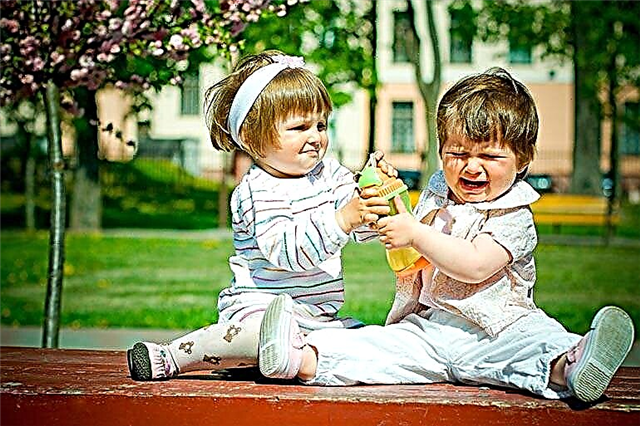
A child who bites his nails does not look very pretty. An adult who has retained this bad habit since childhood looks even more unsightly - and even repulsive. The chances of "re-educating" an adult are slim. So, you need to take care of this in childhood. Dr. Komarovsky talks about how to wean a child from biting his nails.
About a bad habit
About 30% of children bite their fingernails regularly. In adolescence, almost half of boys and girls do this. In 25% of them, the habit persists into adulthood.
According to Komarovsky, it is formed (like other bad habits) as a frequent and repeated sequence of certain identical actions. Gradually, this action ceases to be controlled by the brain and becomes reflexive. The child does not think at all about whether to start biting his nails or not, he just does it. From the habits that are formed in childhood, a person's character is gradually formed.


Parents quite often turn to children's doctors with the question of how to explain to the child all the harm of his habit. But the problem is not solved faster from this, since it goes beyond the purely medical and becomes partly pedagogical, and partly psychological.
Different countries and social circles have their own ideas about bad habits and norms. Evgeny Komarovsky advises to consider those actions of the child that cause him physical and other harm to be unambiguously harmful.

Biting your nails is harmful:
- Regular nibbling of the skin around the nail plate can lead to to thinning of the skin, increased sensitivity of the fingertips to inflammatory processes in the deep skin layers. This can change the color and appearance of the nails, they look unhealthy, and also break.
- Children who bite their nails frequently are more at risk of getting sick, after all, microbes living in the oropharynx can enter the bloodstream through microscopic wounds in the area of the nail plates injured by the teeth and cause quite serious ailments.
Under the nails, there are usually many not the most useful microorganisms and parasites, which, when fingers are in the mouth, easily penetrate into the oral cavity, from where they go on a journey through the body, simultaneously causing a variety of diseases. Sufficiently hard nail plates when trying to gnaw them can injure the enamel of the teeth.
Since the habit is actually considered pathological, doctors even came up with a completely medical definition for it, it is called onychophagia. The habit has its own number in the classification of diseases - F98.
Reasons for the habit
About the reasons why children begin to bite their nails, doctors are still arguing. Some argue that stress, anxiety, and a depressed psychological state are to blame. Others believe that the habit is formed in children whose mothers did not pay too much attention to the education of hygiene skills in the child.
Evgeny Komarovsky says that sometimes the reason for sucking fingers, and then the habit of biting nails, is an unsatisfied sucking reflex in early childhood.


Psychiatrists and psychologists agree that most often the habit of biting nails is formed in children aged 4-5 years. In more rare cases, children begin to injure their own nail plates with their teeth at 2 or 3 years. If up to 5 years old parents do not think about urgent measures, then at primary school age the bad habit will only get worse, since the student's stress increases with every new quarter at school.
One of the most common causes of onychophagia is the personal example of parents.... If one of the adult family members bites their nails, then the baby simply begins to imitate, and then it is very difficult to convince him of the harmfulness of the habit. Every day he sees that dad or mom is doing it, and nothing bad happens to them.
Among other probable causes of addiction, doctors and psychologists name the following factors: heredity, auto-aggression, child's resistance to total control by adults.
Sometimes the child's nails, due to some metabolic pathologies, exfoliate and break on their own - both on the legs and on the hands. Children often find no better way out than to simply nibble on the broken plate.
How to wean?
The fact that the child is allowed once, says Komarovsky, that which the parents once did not pay attention to, is done the second time by the child as a completely legal action that was not prohibited. For this reason, it is advisable to correct the child's actions at the initial stage, while the habit has not yet had time to become just a reflex one.
If biting your nails is already a persistent habit, parents need to make a serious pedagogical decision for themselves. If you fight, then always and everywhere, without days off and holidays. Parents' demands must be clearly motivated. The child should know what exactly he is doing wrong, what it is fraught with for him.


At the initial stage, parents need to establish at any cost the true cause of their child's addiction. If you can't find it on your own, you can turn to a local pediatrician or a child psychologist, but not with the question of how to eradicate the habit, but with the question of where the legs grow from the problem.
The worst thing that parents can think of, who decided to wean their child from a harmful addiction, is to rudely pull him back and beat him on the hands. This does not solve the problem, and the baby will soon understand that it is impossible to bite nails with parents, but alone, when no one sees, it is very possible.

There is no miracle cure in the form of a tablet or syrup for this scourge. It is also ineffective to smear your nails with something bitter (mustard, pepper). Even worse - start to intimidate the child and frighten him with all sorts of horrors, because this bad habit can immediately be replaced by another. The child will quickly start, for example, biting his lips or spitting.
If the reason for biting nails lies in stressful situations, anxiety of the child, you need to teach him to express his emotions in a different way - for example, in words. To do this, there are many psychological techniques based on games that will be interesting for the child to do.
You can give your baby a soothing herbal tea, do a relaxing massage, you must definitely carry out water procedures every day, walk more with him in the fresh air and minimize the time the child spends in front of the TV or computer monitor.
In parallel with the elimination of psychological discomfort, it is necessary to work on strengthening the nail plates, because a strong and resistant nail is more difficult to gnaw. To do this, after consulting a pediatrician, it makes sense to start giving the child calcium supplements in the permitted age-specific dosages. For nails, you can make strengthening baths with saline solutions, with essential oils (cedar oil is well suited).
The child should be taught not only to relax, but also to concentrate. If you keep your baby busy (drawing, mosaic, sculpting or something else), he will have less desire to put his hands in his mouth. It is desirable that the work was made by hand. Fingers should be involved. If it is a joint creative activity with adults, it will be great.


Tips
Do not think that onychophagia is an age-related phenomenon, and the grown toddler will "outgrow it", grow up and suddenly realize how bad and ugly it is, and will stop biting his nails. This almost never happens.

The little tricks of substitution therapy are to offer the child a decent “replacement” - for example, nuts or seeds, if his age allows and is not allergic to nuts.
Every night before going to bed, mom needs to carefully examine the child's nails. In the event of creases, burrs, and delamination, the defect should be carefully corrected with the help of nail scissors and a nail file, so that the child is not tempted to bite off something on his own. This will form a new habit, useful and necessary - to take care of your nails regularly.
Dr. Komarovsky will tell you how to wean a child from biting nails in the video below.



